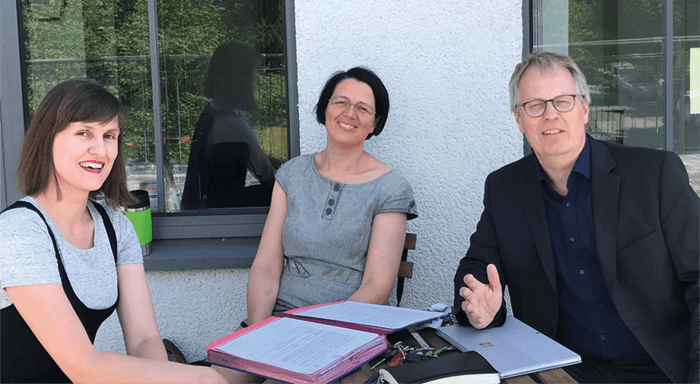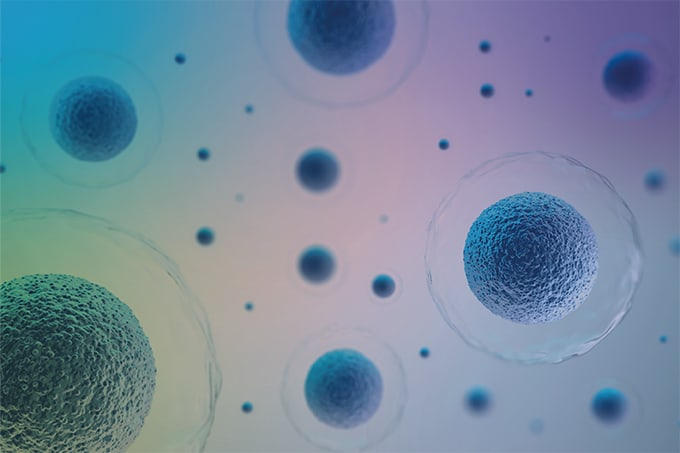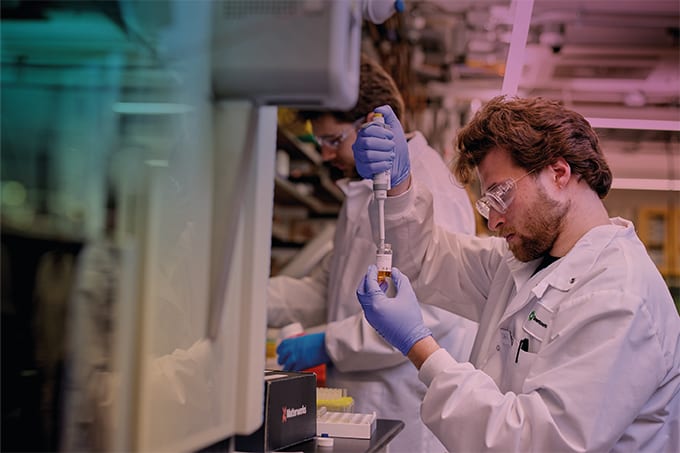SALSA began in November 2012 as a graduate school funded as part of the German Excellence Initiative, and currently has 52 doctoral fellows working on co-supervised research projects. So far, 22 students have graduated from the program and 20 more are about to graduate; plus, there are several postdoctoral fellows completing short- and longer-term research projects within the SALSA framework. The school’s international partners include ETH Zurich in Switzerland, Hebrew University of Jerusalem in Rehovot, Israel, and Universidad de Oviedo, Spain. Janina Kneipp is a co-founder and one of the two co-speakers of SALSA and a professor of Physical Chemistry at Humboldt Universität, Berlin. Katharina Schultens is managing director of SALSA.
What is the aim of the SALSA project?
As part of the SALSA project, we focus strongly on collaboration and development of a common “language” at the interface between chemistry, physics, and the life sciences. Our main motivation is to educate excellent, highly specialized young researchers who think outside the box. We want to instil a sense of the many different problems that analytical scientists are required to solve – today and in the future. SALSA’s administrative structure and its communication culture have shaped graduate education in the natural sciences at our university and with our German university and non-university partners. Our university has committed to fund the project structure further until at least 2022. Of course, the project can only be kept alive if interesting research is carried out. Therefore, we recently started an initiative called “Make & Measure,” which will bring together scientists on the campus and SALSA’s old and new academic partners to secure funding for new collaborative research for analytical science graduate students.Why do students choose SALSA?
Along with the funding of a collaborative research project, SALSA provides both a curricular framework and a social environment. Compared with other graduate schools or similar structured doctoral programs, SALSA probably stands out because it does not focus on a single research area. Instead, we focus on analytical problems that can be found virtually everywhere in science – and anybody who is willing to think about their research from a problem-solving perspective is welcome. We have therefore attracted extremely diverse cohorts of graduate students over the years. In an extremely competitive application process, only genuinely motivated students can succeed – and curiosity is an important driving force for them. Several students – particularly female fellows – also explicitly state that they want to achieve a degree in the analytical sciences because they want the chance to shape policy and decision making in their home countries, so that they can have a different life to that of previous generations.Have you noticed a difference in the motivation of students today?
Not in terms of curiosity or interest in fundamental scientific questions, but perhaps more due to differences in (scientific) cultures. Culturally, SALSA could be considered a melting pot! In addition to different parts of the world, SALSA students also come from different natural science subjects. As an example, the motivations of chemists going for a doctoral degree have – on average – always deviated a bit from those of physicists or biologists, at least in the German system.What is the best approach to teaching analytical chemistry?
Analytical sciences require problem-oriented thinking, in addition to substantial knowledge of instrumentation, data analysis, and, of course, basic chemistry. To drive progress in analytical science, we need input from those in other disciplines – and the same can be said for teaching analytical chemistry. We have established several unique but successful teaching and learning formats. For example, we host sessions prepared by the more advanced doctoral fellows, who share the approaches and methods they are most familiar with and explain them to their fellow students. Such sessions, in particular, see the “teachers” and students working in groups to solve analytical problems. They also invite experts to give short lectures on specific aspects of the topic. We find that our fellows really benefit from working in groups and taking on an active role in mutual teaching.How has technology changed the teaching of analytical chemistry?
We still teach face-to-face a lot, and student-to-student teaching is invaluable in graduate education. Of course, we try to gain as much use from online material and learning as we can. For example, organization and scientific preparation of SALSA’s annual “Make & Measure” event is managed by groups of fellows, some of them located at different universities – including our international partners. For this, the online exchange of data, video teaching, and discussions are crucial.What skills do your students have when starting your course?
The students entering SALSA come from extremely diverse scientific backgrounds. Some students come with an excellent ability to tackle the most diverse kinds of questions, some have gone through an extremely specialized education and still need to develop those skills – but SALSA provides ample opportunity for development with a structured program emphasizing and developing problem-solving abilities in a case-based curriculum.What advantages does the current generation have over those who have gone before?
The current generation is extremely skilled in gathering information from very diverse sources and then quickly, even informally, distributing that information. Such working habits could change the way we present our data, moving towards a real “open source” culture. The Internet has made gathering information much easier than it was for previous generations. On the other hand, taking a broader perspective and checking whether new ideas have been published in “really old” papers from the 1960s and 1970s takes a lot of persistence, sometimes courage. It is our responsibility as teachers to help them set their filters and develop the courage to assess the novelty, originality, and potential impact of their own scientific result.What is your biggest challenge in teaching analytical chemistry?
To not teach it in a traditional way, but to convey that all kinds of chemistry and many aspects of physics and data analysis are needed to push the limits of current analytical chemistry. At the graduate level, students must look beyond their particular research project. But as teachers we need to convey much earlier, at the undergraduate level, how essential it is to gain deep understanding of concepts from different fields, if one wants to become a “real” analytical scientist.What do you spend most of your teaching time focusing on?
We find our students have different ideas about “measuring” things. We spend a lot of time discussing the fact that analytical science starts with a sample, and fighting the misconception that they are just an application of existing “techniques” to mostly known samples. We believe we do a great job in preparing our fellows by having them work in projects supervised by two different but complementary supervisors, and by arranging meetings with renowned scientists and remarkable personalities from the international analytical sciences community.




